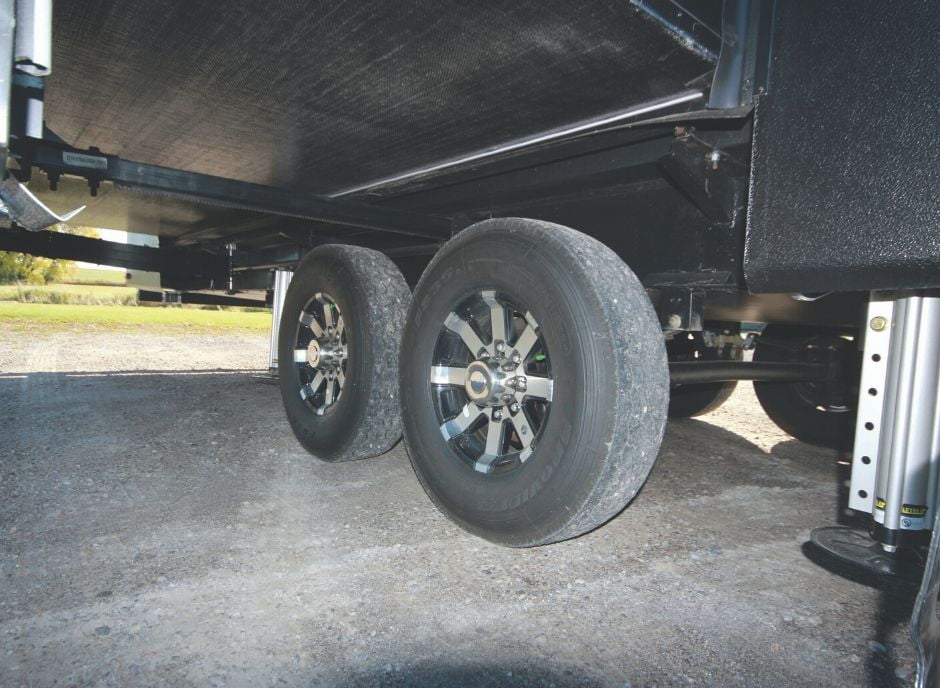Most owners are aware that their trailer has brakes, but for many owners, that’s about as far as their understanding goes. So, ask yourself right now – when were your brakes serviced last? Many will say never. How often should they be serviced? Most wouldn’t know. Because brakes are an out-of-sight/out-of-mind component, owners tend to forget about them. Here’s your reminder to start servicing your RV brakes!
Few, if any, owners will service their own brakes, but it certainly doesn’t hurt to have a basic knowledge of the system on your unit. With this knowledge comes the awareness that will remind you to regularly get those brakes serviced.
Here are the basics you should know about servicing your RV brakes – plus a bit more.
Most trailer brakes are of the older style “drum” variety. The key difference between these and those found on most cars/trucks is that the actuator (the arm that presses the brake pads against the inside of the drum) is electrically activated, rather than hydraulically.
It’s this electric pulse that comes from the trailer brake controller found in the tow vehicle. This system does the obvious – syncs up the trailer and truck brakes. But it does so much more. In-cab readouts will show owners how much braking force is being applied to the trailer so they can change it to account for a loaded or empty condition – even weather can play into how much brake force the trailer should exert.
Brake pads on trailers often don’t need replacement for many years (depending on usage), but because of the amount of time most trailers sit idle, corrosion, binding, seizing and wire deterioration are the true enemies of your brakes. At the very least, trailer brakes should be inspected annually. The key is to clean and lubricate them – something many RV owners can do easily.
Apart from the obvious need to stop the trailer, these brakes also play a much larger role in the overall safe operation of a travelling truck and trailer combination.
For instance, the use of Tow/Haul mode found in many of today’s trucks. Tow/Haul is fully integrated with a truck’s computer which modifies the transmission’s shift mapping on the fly. With Tow/Haul engaged, the computer “knows” that the truck is towing, how much weight it’s pulling and takes the driver’s accelerator inputs into consideration as it adjusts the shift points to pull more engine power for starts, hills and merging. But this is not its only function – when slowing the transmission, downshifts are made at higher rpms promoting engine braking. This reduces wear on the trailer brakes and offers better downhill control.
Any trucker will tell you it’s all about controlling the weight and that’s what the computer is programmed to do; however, many drivers still feel the need to make the decisions so most trucks will allow manual downshifting. Either way this too is a safe driving habit that has everything to do with saving trailer brakes.
Why bother? Research has shown that using the transmissions’ gearing to hold the load on grades can reduce brake rotor temperatures by 100 C during a braking event. Cooler brakes mean sharper stopping when the need arises, not to mention lowering maintenance costs.
So where else do trailer brakes impact driving safety? One of the biggest advances in trailer towing safety in the last decade is trailer sway control. As the name implies, the truck (working with the trailer brakes) can bring a swaying trailer back under control automatically. The key element to this system is the controller which provides a two-way flow of information to the trucks computer that activates the system.
When the computer senses trailer sway, it brakes the truck (and the electric trailer brakes) as needed (sometimes only one side) or cuts engine power and downshifts to bring the trailer under control. And, that’s the best reason to make sure you are servicing your RV brakes regularly.
As we get closer to spring, consider your first seasonal maintenance and make sure the trailer brakes are on the list for inspection at your dealer.




